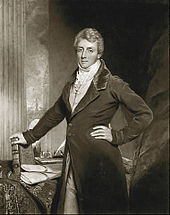Charles Grant, 1st Baron Glenelg
Charles Grant, 1st Baron Glenelg (born October 26, 1778 in India , † April 23, 1866 in Cannes , France ) was a Scottish politician.
Life
Charles Grant was the son of Charles Grant , the chairman of the board of the East India Company . He studied at Magdalene College , Cambridge , where he received his Master of Arts (BA) degree in 1804 and became a Fellow in 1802 . In 1807 he was admitted as a barrister . From 1811 to 1817 he was a member of the British House of Commons for Inverness and Fortrose , and from 1818 to 1835 for Inverness-shire .
He gained some reputation as Speaker of the House of Commons and was named Lord of Treasury in 1813 . He held this office until 1819, when he became Lord Lieutenant of Ireland , the highest official in Ireland and the Privy Councilor . In 1819 Magdalene College awarded him an honorary doctorate as Doctor of Law (LL.D.). In 1823 he was appointed Vice President of the Chamber of Commerce ( Board of Trade ), from September 1827 to June 1828 he was President of the Board (Minister of Commerce) and Treasurer of the Navy ( Treasurer of the Navy ).
After joining the Whigs, he became President of the Board of Control under the 2nd Earl Gray and under Melbourne from November 1830 to November 1834. Here he was primarily responsible for the 1833 Act that governed the composition the government of India changed.
In April 1835 he was made war and colonial minister and as Baron Glenelg , of Glenelg in the County of Inverness , raised to the hereditary nobility . A hereditary seat in the House of Lords was also associated with the title . He gave up his seat in the House of Commons for this. His term of office was very stormy. He had serious differences with Sir Benjamin D'Urban (1777-1849), governor of the Cape Colony , but even more violent were the disputes with William IV and others over the administration of Canada . During his tenure, the 1837 rebellions in Canada fell. His wavering and feeble policy was sharply criticized in parliament. He had heated debates, especially with the Earl of Durham . Efforts to replace him found supporters even among his cabinet colleagues. Lord Glenelg resigned from his political offices in February 1839 and received a pension of £ 2,000 a year in return.
He spent most of the last years of his life abroad and died unmarried in Cannes in 1866. His title of nobility expired.
Individual evidence
- ^ The London Gazette : 19267, 877, May 5, 1835.
Web links
- Charles Grant, 1st and last Baron Gleneig on thepeerage.com , accessed August 19, 2015.
| personal data | |
|---|---|
| SURNAME | Grant, Charles, 1st Baron Glenelg |
| ALTERNATIVE NAMES | Glenelg, Charles Grant, 1st Baron |
| BRIEF DESCRIPTION | Scottish politician, member of the House of Commons |
| DATE OF BIRTH | October 26, 1778 |
| PLACE OF BIRTH | India |
| DATE OF DEATH | April 23, 1866 |
| Place of death | Cannes , France |
